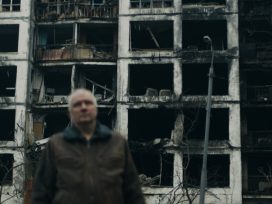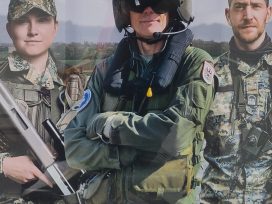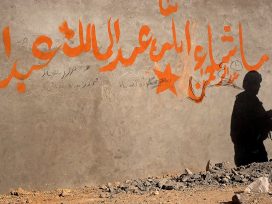Haka, or the formation of identity
‘There are either heroes or enemies, with no in-between. There is no room for indulgence or softness – just demands, judgments and relentlessness.’ How war makes a taboo of pleasure and the erotic.
The ancient Greek chorus of generators thundering around us made me think I had misunderstood Yulia’s words. But she repeated loudly: ‘I never had such orgasms before the war!’
We’d spent the last two hours in a giant restaurant near Khreshchatyk. Before the war, the place was always crowded, but after passing through the tangled underground labyrinths and finally reaching the spacious hall, I noticed that I was the only one there. Candles flickered dimly, adding to the confusion and darkness. The vague shapes of servers could be seen moving in the shadows. I was seated in the place with the most natural light, next to the window that overlooked the arcade of the shopping center one level below. Yulia was running late, so I was checking out the windows of holiday shops when suddenly it went completely dark. ‘This has never happened before,’ the administrator said worriedly. She and I watched in silence as the pale beacons of smartphone flashlights lit up in boutiques, whose glow always soothed with the eternal promise of luxury. More powerful flashlights joined them, and soon I felt that I was watching the birth of galaxies in the blackness of the universe, the dance of lonely stars in the dark of eternity.
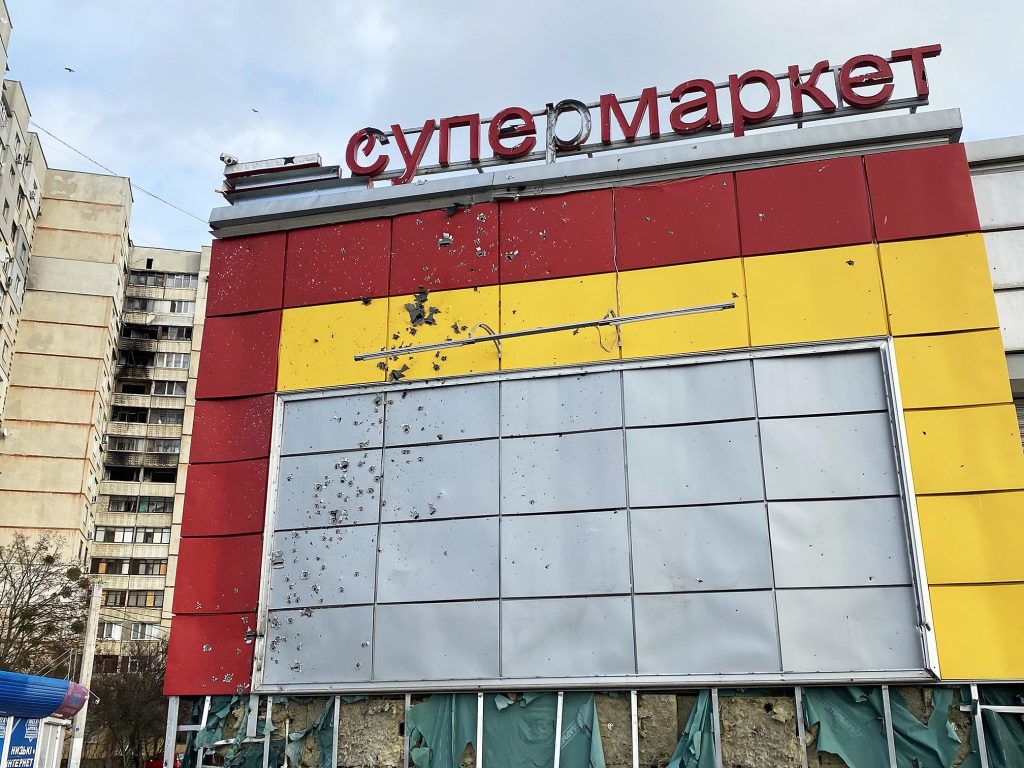
Supermarket, Saltivka, Kharkiv, 2022. Photo by Andriy Rachinskiy
When Yulia finally came, we ordered some food. I chose the burrata on a bed of pumpkin mousse, and Yulia went for vorschmack in waffle cones and a glass of white wine. We exchanged personal news, and then I found a video on my smartphone that I’d begged my friend Nazar to send me.
A few years ago, Nazar and I set out to find the grave of Ukrainian writer and archaeologist Viktor Petrov at the Lukianivka Military Cemetery. Petrov’s close friends and colleagues were met with repression in the 1930s – they were all shot, arrested, or exiled. However, Petrov lived a long life, possibly due to his cooperation with the system. As a result, the writer, professor, and archaeologist was laid to rest among high-ranking military officers like generals and colonels.
At first, Nazar and I mistakenly searched for Petrov’s grave across the street, among the lush greenery in the cemetery, which was abundant during the early days of summer. Eventually, we stumbled upon the grave of Kostya Zerov, the son of Petrov’s beloved woman. Tragically, Kostya died suddenly from scarlet fever just as his father, the brilliant poet and translator Mykola Zerov – a close friend of Petrov – was undergoing intense persecution. The 10-year-old’s grave serves as a symbol for the burial of Mykola, who was shot in the killing fields of Sandarmokh in 1937 during Stalin’s Great Terror.
Nazar is a man of literature. Before the invasion, he worked in a bookstore, where he was known for making some of the tastiest filter coffee in Kyiv. He went to the Military Commissariat on the first day of the war. I saw him a week ago after he’d received leave from the front for a shrapnel wound and facial surgery. Nazar has a damaged auditory nerve, and he will have ringing in his ears for the rest of his life – his own personal air raid siren to remind him of what he’d witnessed, including the five soldiers who died before his eyes.
He didn’t want to say anything about his military service. Instead, Nazar showed me a video from a few months ago, when he was sent to Great Britain for military training. There were several Maori instructors from New Zealand, and on the last evening, they performed a ritual haka dance for the members of the Ukrainian military.
Every time I watch it, I get goosebumps. This video is so captivating that I can’t help but show it to others. The sight is beautiful and ugly, repelling yet impossible to look away from – the aggressive movements, vigorous leg stomping, bulging eyes, and fully extended tongues are perfectly coordinated. The leader, who set the rhythm and started the song, was shirtless, his face covered in dark paint. He held the Ukrainian flag in his hands.
The next thing Yulia said after she and I went out onto the icy hilly streets – more precisely, she didn’t speak, but screamed, competing with the voices of the generators – was her confession. A beam of light from an elderly man’s headlamp, who was navigating his way towards us like a searchlight looking for escaped prisoners, momentarily blinded us. Then Yulia added, ‘Maybe I shouldn’t say such things out loud.’
I took a closer look at Yulia. She seemed radiant amidst the darkness of the central streets of Kyiv. Her skin glowed, her dewy eyes sparkled with delight, and she licked her lips as if she still tasted her vorschmack that she’d washed down with a cool glass of wine.
She regaled me with tales of her clandestine rendezvous, divulging the intricacies and hues of her feelings, but the cacophony of the environment and the absolute darkness made it difficult to fully grasp her every word. Yet it seemed to me Yulia was recounting the height of her climaxes during missile strikes – the moment a missile hits its mark, or the exhilaration when it’s shot down by the air defense system, the fragments spiraling through the air. She described the extravagant thrills she felt under the drone’s rumbling, the rhythm and pulsating movements orchestrated by the wails of the air raid siren.
She told me about the intriguing peculiarities of hotel meetings during power outages: the administrators in cold lobbies lit by eerie spotlights; the secret side doors to stairways; the laborious climb to the seventeenth floor when elevators were out of order; the sounds of stealthy footsteps; the ambiguous shadows passing quietly; a mysterious glow swaying in the air, and a door skillfully propped open with a crowbar by a staff member as electronic keys were useless. All this in complete darkness, on the seventeenth floor, where you can imagine but not see the outlines of the city below.
She went on to describe meetings in rented apartments, including a memorable one where, at their most tender moment, they were interrupted by a sudden raid from the Office of Counterintelligence. A wary neighbour had reported the suspicious visitors who had snuck into the building, believing that they might be dangerous saboteurs.
‘I probably shouldn’t talk about this out loud,’ she repeated, her eyes shining happily.
She really was taking a risk by admitting something like that. In wartime, judgments and views leave no room for maneuvering, binding people into a single, rigid position, like an ossified corset. There are either heroes or enemies, with no in-between. There is no room for indulgence or softness – just demands, judgments and relentlessness. It sets the highest bar of expectations with no recognition of individual features, weaknesses and subtleties. The corset is fixed in place with phrases like ‘it’s not timely,’ ‘to the very end,’ and ‘identity formation’. Life gradually became imbued with the undeniable conviction that everyone has a reason to be controlled and judged, and this was deemed necessary by our society’s moral obligation and right to defend itself.
Pathos and tension became the go-to methods for achieving this. But they became an addiction, like a drug, and it was hard to achieve catharsis without them. Society’s perception became distorted, unable to see anything colorful in more neutral tones, unable to see anything that wasn’t about war. A milder tone was even seen as a threat, leading to aggression. Lack of aggression itself was seen as a source of aggression. The more intense the emotions, the greater the belief in the right to control and demand.
‘Of course, Yulia!’ I shouted. ‘This is not something you should talk about! This is not the time for such things!’
‘I know!’ Yulia shouted back to me. ‘That’s why I can only tell you about it!’
Under the infernal roar of generators rotating around their own axis on the streets of black ice, she assured me, as if she understood what she was doing was wrong. But that’s who she is, it’s part of her identity. All this sex is her haka: her ritual, her cleansing fire, her dance. And she will continue dancing to it.
‘I’ll cum to the very end!’ Yulia shouted just at that moment, when the windows of the houses illuminated the street, and the generators fell silent.
This article is part of Meridian Czernowitz’s series State of War, an online anthology of essays by Ukrainian intellectuals about the Russian invasion of Ukraine. One hundred Ukrainian authors will recount their own experiences, impressions, observations and feelings in one hundred texts. The creation of the anthology takes place within the framework of the USAID-backed Deepening the internal cultural dialogue in Ukraine project.
Published 24 February 2023
Original in Ukrainian
Translated by
Kate Tsurkan, Yulia Lyubka
First published by Meridian Czernowitz
© Meridian Czernowitz / Sofia Andrukhovych
PDF/PRINTIn collaboration with
In focal points
Newsletter
Subscribe to know what’s worth thinking about.
Related Articles

For those who suffered the consequences of Yalta’s division of Europe, the Helsinki Final Act brought grounds for optimism. Today, as Russia’s regressive war on Ukraine reopens old conflicts, it stands as a monument to European modernity.
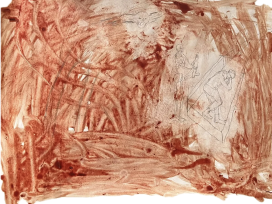
Artist Marharyta Polovinko’s creativity persisted in a tormented form through her experiences as a soldier on the Ukrainian frontline. The words of a recently called-up fellow creative and young family man provide a stark reminder that the Ukrainian military is buying Europeans time.

